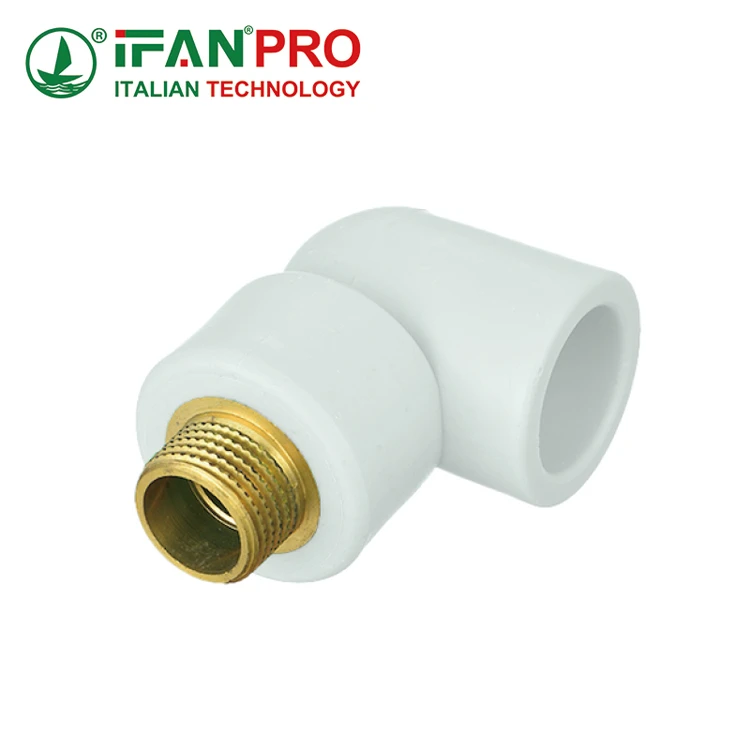What Are PPR Male Elbows?
PPR male elbows are essential pipe fittings designed for hot and cold water systems. These curved connectors feature male threads on one end. They enable smooth directional changes in piping layouts.
The polypropylene random copolymer construction offers exceptional durability. PPR material resists corrosion and chemical damage. These fittings maintain structural integrity under high temperatures and pressures.
Why Choose Factory-Direct PPR Male Elbows?
Cost Advantages
Factory-direct purchasing eliminates middleman markups. Wholesale buyers save 30-50% on bulk orders. Direct sourcing ensures competitive pricing for contractors and distributors.
Quality Assurance
Manufacturing facilities control every production stage. Quality inspectors test each batch for dimensional accuracy. Raw material verification prevents defective products from reaching customers.
Customization Options
Factory production allows specification modifications. Custom thread sizes accommodate unique project requirements. Special coatings enhance performance in challenging environments.
Key Features of High-Quality PPR Male Elbows
Thread Precision: Machine-cut threads ensure leak-proof connections. Tight tolerances prevent cross-threading issues. Professional threading meets international standards.
Temperature Resistance: PPR material withstands temperatures up to 95°C. Thermal expansion characteristics minimize stress on joints. Long-term exposure doesn’t compromise fitting integrity.
Pressure Rating: Standard fittings handle pressures up to 25 bar. Reinforced designs support higher pressure applications. Safety margins exceed typical residential and commercial requirements.
Chemical Compatibility: PPR resists acids, bases, and organic solvents. Non-toxic material meets drinking water standards. Safe for potable water distribution systems.
Applications for PPR Male Elbows
Residential Plumbing
Hot water supply lines benefit from PPR’s thermal properties. Cold water distribution requires corrosion-resistant materials. Bathroom and kitchen installations demand reliable connections.
Commercial Systems
Office buildings need durable piping solutions. Hotels require high-capacity water distribution. Restaurants demand food-grade compatible materials.
Industrial Applications
Manufacturing facilities use PPR for process water. Chemical plants require corrosion-resistant fittings. Power generation facilities need high-temperature solutions.
Sizing and Specifications
Common sizes range from 20mm to 110mm diameter. Thread specifications follow ISO and DIN standards. Wall thickness varies based on pressure requirements.
Smaller diameters suit residential applications. Medium sizes work for commercial projects. Large diameters handle industrial volume requirements.
Installation Best Practices
Preparation: Clean pipe ends thoroughly before assembly. Remove burrs and debris from cutting operations. Inspect threads for damage or irregularities.
Assembly: Apply appropriate thread sealant or tape. Hand-tighten fittings to avoid over-torquing. Use proper tools for final tightening.
Testing: Pressure test systems before commissioning. Check for leaks at all connection points. Verify proper flow characteristics through the system.

Quality Standards and Certifications
Reputable manufacturers follow ISO 9001 quality management. Product certifications include CE marking for European markets. NSF certification ensures drinking water safety compliance.
Third-party testing validates performance claims. Material certificates document raw material quality. Batch tracking enables quality traceability.
Wholesale Purchasing Considerations
Minimum Order Quantities
Factory orders typically require 1000+ piece minimums. Mixed size orders may have higher MOQs. Special specifications increase minimum requirements.
Lead Times
Standard products ship within 2-3 weeks. Custom specifications extend delivery to 4-6 weeks. Rush orders incur additional charges.
Packaging Options
Bulk packaging reduces per-unit costs. Individual bagging simplifies inventory management. Custom labeling supports brand requirements.
Maintenance and Longevity
PPR fittings require minimal maintenance throughout their service life. Periodic visual inspections identify potential issues. Thermal cycling doesn’t affect fitting performance.
Expected service life exceeds 50 years under normal conditions. UV exposure may require protective measures. Indoor installations maintain properties indefinitely.
Cost-Benefit Analysis
Initial PPR costs exceed traditional materials. Long-term savings come from reduced maintenance. Labor costs decrease due to easier installation methods.
Energy efficiency improves with better insulation properties. Replacement frequency drops significantly. Total ownership costs favor PPR systems.
Selecting the Right Supplier
Established manufacturers offer consistent quality. Factory certifications validate production capabilities. Technical support assists with specification questions.
Sample programs allow pre-purchase evaluation. Reference projects demonstrate real-world performance. Warranty terms protect against defects.
Market Trends and Future Developments
PPR adoption continues growing globally. Environmental regulations favor recyclable materials. Energy efficiency requirements drive material selection.
Smart building integration creates new opportunities. IoT sensors monitor system performance. Predictive maintenance reduces unexpected failures.
Conclusion
High-quality PPR male elbows from wholesale factories deliver superior value. Direct sourcing provides cost advantages and quality control. Professional-grade fittings ensure reliable system performance.
Choose experienced manufacturers with proven track records. Verify certifications and testing compliance. Consider long-term benefits over initial costs.
Factory-direct purchasing supports project success through reliable supply chains and technical expertise.













Commentaires récents